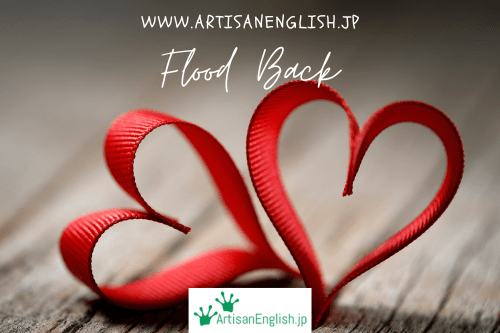
YouTube / iTunes / Spotify / Radio Public / Pocket Casts / Google Podcasts / Breaker / Overcast
Listen to ArtisanEnglish.jp posts & lesson intros here.
WotD: Flood back
Well, tomorrow is Valentine’s Day.
You may be feeling a mix of emotions.
It’s a time of love, but it can also make us reflect on past relationships.
During this season, memories of current and previous lovers often come flooding back, reminding us of the special moments we’ve shared.
Flood back is a phrase that means to suddenly remember something strongly.
For example, when you see a romantic movie or hear a particular song, feelings from past romantic experiences may flood back.
This happens to many people when they think of their first crush or a beloved partner.
At Valentine’s, the atmosphere is filled with love messages and gift ideas, and this can make memories flood back even more.
Naturally, some of these memories are ones you’d rather leave dormant, but you have to learn to take the good with the bad.
You might recall the nervous excitement of a first date or the smell of a former partner’s perfume.
These memories can flood back at any moment, bringing joy, nostalgia or even a twinge of sadness.
Sometimes, when we see couples exchanging gifts or sharing kisses, thoughts of heartbreak can also flood back.
Past relationships may remind us of unfinished stories or bad endings, but they can also help us appreciate the love we have now.
It’s important to embrace these memories when they flood back.
They shape who we are today and remind us of what we truly want in a relationship.
Whether it’s a bittersweet smile or warm feelings of love, these memories are part of the journey.
So, if thoughts and memories flood back this Valentine’s Day, embrace them.
Learn from the past, enjoy the present, and be open to future love.
Flesch-Kincaid Readability Test
This post is understandable by someone with at least an 8th-grade education (age 13 – 14).
On the Flesch-Kincaid reading-ease test, this post scores 69.
The easier a passage is to read, the higher the score on a scale of 0 – 100.

